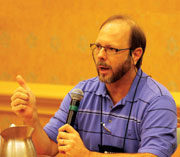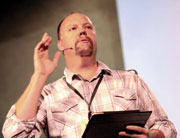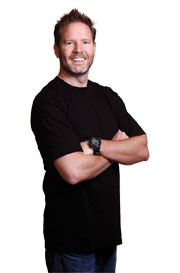
By Rez Gopez-Sindac
Church people often are quick to admit that they’re not perfect. While the statement is true and may even suggest humility, when it comes to church business – such as hiring staff – it simply is not good policy.
Unlike a secular company, a church carries the mandate to impact people’s lives both for the here and now and eternity. Borrowing from Jim Collins’ famous metaphor, if church is like a bus headed to its destination, it must seek to have the right people in the right seats, and it must strive to be the right bus for those people.
A tall order, but it can be done. Five executive staff from four megachurches all agree: If church leaders make quality hiring decisions, they will find the right employees who will steer their imperfect churches in the right direction.
Don’t cut corners
 Hiring the right way is a multistep process, says Glenn Wood, pastor of church administration at Seacoast Church, Mount Pleasant, SC. At Seacoast, the process starts with correctly defining the needs for the position. Then the position is advertised internally and, if needed, outside the church. Applicants are evaluated. Those qualified move on to the interview level. After this point, the list narrows to the top two or three candidates. More interviews follow. Next, the final selection is made. Then, finally, the chosen one gets an offer.
Hiring the right way is a multistep process, says Glenn Wood, pastor of church administration at Seacoast Church, Mount Pleasant, SC. At Seacoast, the process starts with correctly defining the needs for the position. Then the position is advertised internally and, if needed, outside the church. Applicants are evaluated. Those qualified move on to the interview level. After this point, the list narrows to the top two or three candidates. More interviews follow. Next, the final selection is made. Then, finally, the chosen one gets an offer.
Still, bad hires happen, Wood admits. “We were interviewing for an accounting position and found what appeared to be a great match. After they started, it became very evident that while the employee was qualified, they weren’t the best fit for the position. We both agreed it wasn’t a good fit and they left to find another position outside of the church.”
As with most churches, Real Life Church, Valencia, CA, also has experienced a few situations where an applicant had a good resume and the interview went well, but things didn’t work out as well as they had hoped. “Most of the time it was because we rushed the hiring process or we didn’t ask enough questions,” says executive pastor Jeremy Vanderlinden. “We’ve learned that it’s better to lengthen the interview process and not make a hasty decision,” adds Jane Gilbertson, the church’s HR generalist.
 Gregg Swadener, senior director of operations at Vineyard Community Church, Cincinnati, OH, puts it this way: “We strongly believe that if we don’t get impatient, [if we] do our homework and listen well enough, God will send us the right people with the right gifting to fill our open positions in a way that furthers our calling and His kingdom.”
Gregg Swadener, senior director of operations at Vineyard Community Church, Cincinnati, OH, puts it this way: “We strongly believe that if we don’t get impatient, [if we] do our homework and listen well enough, God will send us the right people with the right gifting to fill our open positions in a way that furthers our calling and His kingdom.”
Swadener estimates that hiring an employee can cost from $1,000 to $2,000 or more depending on other costs like advertising or agency assistance. But the bigger issue, he points out, is what it costs to hire the wrong person. “That could range in the tens of thousands, depending on how long the mistake is accommodated,” he says.
Why bad hires happen
Bad hires usually stem from one of the following mistakes, says Jerry Hurley, team development leader at LifeChurch.tv, Edmond, OK:
- A lack of clarity on deliverables for a specific role, making it more difficult to find the right fit.
- Focusing more on experience and not paying enough attention to fit.
- Loss of objectivity in the selection process.
Hurley says loss of objectivity can come from perceived pressure to fill a position, becoming overly invested in a candidate too early, and not recognizing when personal biases come into play.
The starting point to finding the right fit, Hurley adds, is a clear understanding of an organization’s values and key behaviors. “Too many churches don’t take the time to identify these critical components in the hiring process,” he says.
Swadener, on the other hand, emphasizes objectivity and the spiritual factor when hiring employees. “You can certainly increase your chances of success if you objectively consider and honestly evaluate their core behavioral assessment, mental aptitudes, spiritual beliefs, where they are in their personal walk with Christ, do they feel called to the position and the church … ”
 Similarly, at Real Life Church, the biggest indicator that a person is the right fit is their humility and willingness to take direction and coaching, says Gilbertson. “If they are teachable, most likely they will fit well in the job because their humble spirit comes through.”
Similarly, at Real Life Church, the biggest indicator that a person is the right fit is their humility and willingness to take direction and coaching, says Gilbertson. “If they are teachable, most likely they will fit well in the job because their humble spirit comes through.”
Hiring tools are a big help
Like most organizations, large churches use assessment tools and systematic processes to help increase their success in hiring the right people.
At Seacoast Church, specific tools are used for specific positions. If it’s to evaluate an applicant’s software skills, the church uses TotalTesting.com. At one point, when the church couldn’t decide between two qualified applicants, this tool, says Wood, helped them make the right choice.
Wood says the church also has used a “roundtable” interview approach. Applicants are not only interviewed by the person they would be working for, but also by others on staff who might interact with the person. “This helps us make sure we have multiple people providing input and having a say in the hiring of staff,” adds Wood.
A pre-employment testing called The Achiever is the tool of choice for Vineyard Community Church. According to Swadener, it measures six mental aptitudes and 10 personality or behavioral dimensions and compares the results for a particular candidate to the results of others who have been successful in similar positions.
“We believe the objective information we get from this tool significantly enhances our success in selecting the right person and not overlooking critical issues,” says Swadener. However, he quickly points out that the tool should be used to supplement good judgment and excellent interviewing skills. It should not be weighted more than one-third in the hiring decision, yet he adds, “We would be lost without the information it provides.”
 At LifeChurch.tv, a multi-interview approach is also used, as well as tools and tests to evaluate an applicant’s personality, basic skills, cognitive ability, attitude and spiritual gifts. “Some of the tools can’t predict overall fit or effectiveness, but they help us make sure a person has the skills to perform tasks pertinent to their job,” says Hurley. “For example, does a person interviewing for a role in finance have math skills?”
At LifeChurch.tv, a multi-interview approach is also used, as well as tools and tests to evaluate an applicant’s personality, basic skills, cognitive ability, attitude and spiritual gifts. “Some of the tools can’t predict overall fit or effectiveness, but they help us make sure a person has the skills to perform tasks pertinent to their job,” says Hurley. “For example, does a person interviewing for a role in finance have math skills?”
And some tests and tools are very strategic and have a high correlation to long-term success and performance, Hurley adds.
‘Judgment’ day
Now that you found the right person for the job, the challenge is how to check the employee’s progress and help them get to the next level of effectiveness. Performance reviews play a key role.
 “We give performance evaluations once a year in the fall,” says Real Life Church’s Jeremy Vanderlinden. He says evaluations are based on the previous 12 months of work and highlight specific events during the year, both good and bad.
“We give performance evaluations once a year in the fall,” says Real Life Church’s Jeremy Vanderlinden. He says evaluations are based on the previous 12 months of work and highlight specific events during the year, both good and bad.
Vineyard Community Church, Seacoast Church, and LifeChurch.tv also conduct performance appraisals annually. At Vineyard, employees complete a staff questionnaire and set their critical goals for the coming year. Both the employee and his or her director discuss the review and the questionnaire and reach a consensus on the employee’s goals.
At LifeChurch.tv, the evaluation has two components – half of the review is based on performance to measurable goals, and the other half is based on how the team member exemplifies important cultural values. Hurley says the church has developed an online performance management system called MyPerformance that they hope to make available free to churches soon.
For Seacoast Church, performance evaluations are a time to ensure employees are meeting the expectations of the position and the church, says Wood. For Real Life Church, it’s usually a time to give a merit increase, “so our employees can leave the room feeling good about their accomplishments during the past year,” says Vanderlinden.
All four churches put a high premium on recognizing and rewarding great employees. Wood says at Seacoast Church they give a monthly “You Da” award to employees voted by their peers. Prizes include movie tickets and gift cards. At Vineyard, outstanding performance by a staff member, volunteer or ministry team is recognized in their monthly all-staff meetings, says Swadener.
When it comes to disciplining nonperforming staff, Wood says at Seacoast discipline is done in private. “We work to document the situation and keep the employee informed of the challenges we face,” he says. “Ultimately this could lead to termination but we try and work to correct the behavior without having to move to this step. We have a culture of grace on the staff, which is sometimes a challenge in getting challenging behaviors and situations properly documented, but we strive to make this a regular habit. We strive to make sure that if we have to let someone go, they aren’t surprised by the action.”
Graceful exit
Grace goes a long way at Seacoast. When it becomes necessary to let a nonperforming employee go, Wood says the church works to find a solution so they can move on and find another position. “This may include severance pay, job placement, additional training, and similar functions to assist them. We work to make it more than fair for the employee.”
At Vineyard, if performance is an issue, the church initiates a performance development plan process. Swadener says this is a formal, documented process that describes what the issues are, what needs to change in order to be successful, what the time frame is for improvement to be accomplished and sustained, what the church can do to help the employee with the process, and what the consequences of failure will be.
If performance is an issue because the employee is not satisfied with their position, future opportunities – or for any other reason – Vineyard also does not hesitate to suggest, in a graceful way, that it can assist the employee in finding something elsewhere that is a better match for them. “We offer them resume assistance, job coaching or time off for interviews to assist them in the process,” says Swadener.
LifeChurch.tv echoes the same graceful spirit. Hurley says the church recognizes that not every employee is supposed to be part of the team forever. “If it comes time for a great person to leave our team, our goal is to help the team member transition in as healthy a manner as possible.”
For Real Life Church, it’s important that the employee who is leaving leaves well. “We ask the employee to be considerate of God’s church and not create negativity that can impact the mission we are all trying to accomplish,” says Vanderlinden.
______________________________________________
First choice: character or skill?
Glenn Wood (Seacoast Church): Character by far; we can teach skills.
Gregg Swadener (Vineyard Community Church): Skill can do the job without character, but the results will be diminished, and character alone without skill will fail. Both are critical.
Jerry Hurley (LifeChurch.tv): No question, character.
Jeremy Vanderlinden (Real Life Church): Definitely character. Usually people with character have the skills necessary to do the job and do it with integrity. Our church would rather hire someone with more character than skill, because usually that person is willing to learn the skill and outperform in the long run.
______________________________________________



Great article with great insight and suggested tools….Thank you. We also have a team interview approach and use what we call our Five C’s to guide not only our interviews but our day by day operating environment.
Character, Chemistry, Catalytic, Competency, and Collaboration.
Enfolded within these are…
Loves God above all else/Completely
Loves ourselves Correctly
Loves others Compassionately
Trust – Trusts others and is worthy of trust
Vulnerable and Transparant
Selfless/ Humble
Does not avoid conflict